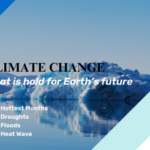WMO report declares 2011 to 2020 being the warmest decade: Basics Explained

The World Meteorological Organization (WMO), an agency of the United Nations(UN) at the U.N.’s COP28 climate summit, put out a report saying that the rate of climate change has “surged alarmingly,” with 2011 to 2020 being the warmest decade on record.
Continued rising concentrations of greenhouse gases fuelled record land and ocean temperatures and turbo-charged a dramatic acceleration in ice melt and sea level rise,
The rate of climate change surged alarmingly between 2011 – 2020, which was the warmest decade on record. The report cites that the rate of climate change “surged alarmingly” and “turbo-charged” dramatic glacier loss and sea-level rise during this period as the potent reasons for the same.
As per the report Glacier and ice sheet loss is unprecedented; sea level rise accelerates; Ocean heat and acidification damage marine ecosystems; Extreme weather undermines sustainable development and Ozone layer is on track to recovery. Glaciers thinned by around 1 meter per year – an unprecedented loss – with long-term repercussions for water supplies for many millions of people.
The Antarctic continental ice sheet lost nearly 75% more ice; Global mean sea level rise is accelerating, largely because of ocean warming and the loss of land ice mass; Marine heatwaves are becoming more frequent and intense.
WMO
It originated from the International Meteorological Organization (IMO), which was founded in 1873. Established in 1950, WMO became the specialized agency of the United Nations in 1951 for meteorology (weather and climate), operational hydrology and related geophysical sciences. with its headquarters in Geneva, Switzerland, and is a member of the United Nations Development Group.
LEARNING FROM HOME/ WITHOUT CLASSES/ BASICS
ANTHROPOGENIC CLIMATE CHANGE is a change caused by human
activity.
CLIMATE CHANGE: Climate Change refers to any change in climate over time whether due to natural variability or as a result of human activity.
Global warming is the long-term heating of Earth’s climate system observed since the pre-industrial period (between 1850 and 1900) due to human activities, primarily fossil fuel burning, which increases heat-trapping greenhouse gas levels in Earth’s atmosphere. The term is frequently used interchangeably with the term climate change, though the latter refers to both human- and naturally-produced warming and the effects it has on our planet.
Greenhouse gases allow sunlight (shortwave radiation) to pass through the atmosphere freely, where it is then partially absorbed by the surface of the Earth. Greenhouse gases are able to trap heat (longwave radiation) in the atmosphere, keeping the Earth’s surface warmer than it would be if they were not present. These gases are the fundamental cause of the greenhouse effect. Increases in the number of greenhouse gases in the atmosphere enhances the greenhouse effect which is creating global warming and consequently climate change.
So the more greenhouse gases you have in the atmosphere, the more heat stays on Earth. The principal forcing greenhouse gases are: Carbon dioxide (CO2); Methane (CH4); Nitrous oxide (N2O); Fluorinated gases.







0 Comments